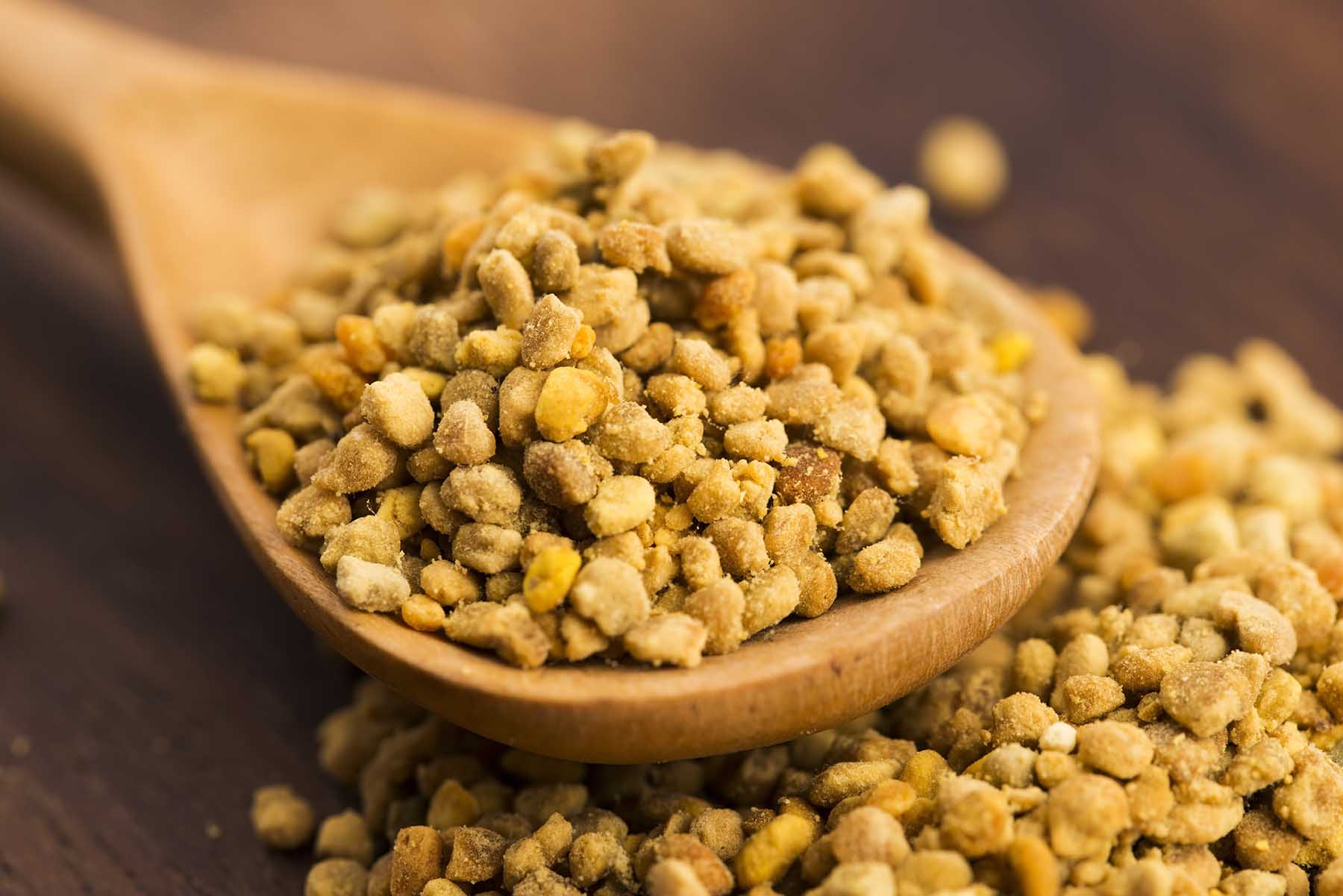Advertisement
The 10 Best Benefits of Bee Pollen
This antioxidant powerhouse enhances immune health and helps protect against disease
Fact-Checked
This article has been written and fact-checked by experts in the field.

Combats inflammation
Bee pollen is a dietary supplement made from flower pollen, nectar, and bee secretions. It’s rich in carbohydrates, protein, amino acids, and healthy fats. It’s also an excellent source of antioxidant vitamins, minerals, flavonoids, and phenolic acids that improve health and help protect against many diseases.

Chronic inflammation throughout the body ages and damages the cells and is a risk factor for many diseases. Stress, illness, medications, and environmental free radicals cause oxidative stress and inflammation. Diets high in refined carbohydrates (sugar and white flour), red meat, and trans fats can also be inflammatory.
Bee pollen is loaded with nutrients including vitamin A, E, C, flavonoids, and phenolic acids, which have antioxidant properties that reduce inflammation and protect the cells.
Improves metabolic syndrome

Metabolic syndrome is a cluster of risk factors associated with heart disease and type 2 diabetes, including high blood sugar, elevated blood lipids, and high blood pressure.
Studies show that bee pollen may help protect against metabolic syndrome by lowering blood sugar and protecting the heart.
Additionally, the best way to prevent metabolic syndrome is with regular exercise and eating a diet low in saturated and trans fats, refined carbohydrates and sugar, and getting more fiber from fruits, vegetables, and whole grains.
Controls blood sugar

Chronic high blood sugar that’s left untreated damages the large and small blood vessels of the body and can cause heart disease, circulation problems, loss of eyesight, and even kidney disease.
Bee pollen may have potential anti-diabetic benefits. Studies show that bee pollen controls blood sugar by inhibiting the enzymes that break down carbohydrates to glucose. This action helps slow the breakdown of disaccharides and lowers the amount of glucose in the blood.
Cinnamon, chromium, apple cider vinegar, and fiber are a few other things that may help naturally regulate blood sugar.
Protects the liver

The liver is the site of many important bodily functions related to digestion and the removal of toxins from the body.
Certain chemotherapy treatments cause free radical damage that can injure the liver. Studies show that bee pollen can help ease the chemotherapy side effects and protect the liver from additional damage.
Another liver injury is non-alcoholic fatty liver disease (NAFLD), an accumulation of fat in the organ that commonly occurs in people who live with obesity. Studies show that the phenolic compounds in bee pollen may help decrease the fat accumulation in the liver.
Prevents heart damage

A heart attack (myocardial infarction) cuts off blood and oxygen from the heart muscle and can cause permanent damage. Antioxidants can decrease the oxidative stress that causes cardiac damage from a myocardial infarction.
Studies show that the antioxidant power of bee pollen may help prevent damage to the heart in patients with myocardial infarctions. Bee pollen can also protect the heart from free radicals to prevent further cardiac damage as well.
Builds stronger bones

Bones are made mostly of collagen and calcium. Calcium gets deposited into the bones until we reach the age of 20, and bones then start to lose the nutrient over time. Bee pollen may have a positive effect on bones by helping to boost their calcium levels
In addition, getting enough vitamin D and calcium and doing weight-bearing exercises help to keep bones healthy and slow bone loss.
Eases allergic reactions

An allergy is an immune system reaction to a foreign substance that doesn’t cause a reaction in most people. During a reaction, the immune system produces antibodies and reactions can range from minor to severe.
Bee pollen protects the immune system and has an anti-allergy effect. Studies show that bee pollen also protects against some of the negative effects of aflatoxins, foodborne poisonous substances produced by mold that can contaminate nuts and grains.
Boosts brainpower

Cognitive impairment is when someone has trouble learning, remembering things, or minor everyday decisions.
Studies show that bee pollen may be an effective treatment for cognitive impairment. The antioxidant activity of this supplement protects against oxidative stress and neuroinflammation (the inflammatory response in the brain).
Omega-3s found in fatty fish, walnuts, berries, green leafy vegetables, tea, and coffee have other dietary components that can also boost brain health.
Prevents leaky gut

The intestinal lining forms a barrier between the gut and the bloodstream. An unhealthy gut causes the lining to become more permeable which can result in toxins leaking out into the lining. A leaky gut causes inflammation and changes in the gut microbiota that may lead to health issues involving digestion.
Bee pollen protects the intestinal barrier, and studies show that it may be useful in treating inflammatory bowel disease (IBD).
Improves PCOS

Polycystic ovary syndrome (PCOS) is a condition characterized by a group of symptoms, including excess androgens, small cysts on the ovaries, and irregular menstrual cycles. Women with PCOS often have problems with fertility and are more likely to develop heart problems, diabetes, and some forms of cancer.
Insulin resistance may play a role in the increased androgens, which affect the function of the ovaries. Bee pollen helps regulates ovarian function and has an anti-androgenic quality that may improve symptoms of PCOS.





